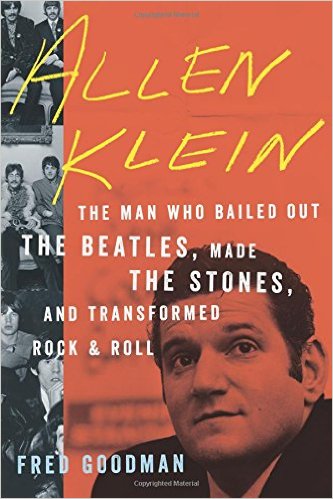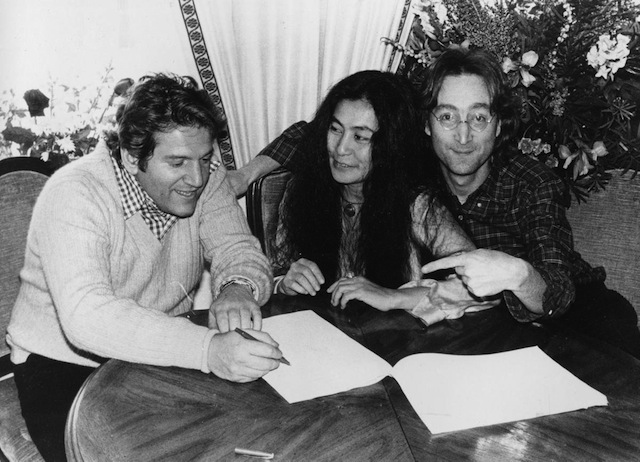 In the eternal parlor game of “Who Broke Up The Beatles?” Allen Klein ranks as high among the unjustly blamed as Yoko Ono. In the 1978 TV film All You Need Is Cash, the genius parody of The Beatles about a markedly similar band called the Rutles, he was portrayed by John Belushi as “Ron Decline, the most feared promoter in the world” – his employees would off themselves rather then face his displeasure. Two rock music buffs who I mentioned I was reading this book to shivered at the sound of his name.
In the eternal parlor game of “Who Broke Up The Beatles?” Allen Klein ranks as high among the unjustly blamed as Yoko Ono. In the 1978 TV film All You Need Is Cash, the genius parody of The Beatles about a markedly similar band called the Rutles, he was portrayed by John Belushi as “Ron Decline, the most feared promoter in the world” – his employees would off themselves rather then face his displeasure. Two rock music buffs who I mentioned I was reading this book to shivered at the sound of his name.
Obviously Klein was a significant music business figure with a story that should be told that includes two of the biggest acts in popular music: The Beatles and The Rolling Stones. And someone, as author Fred Goodman shows in the book, who was in serious need of a corrective regarding his reputation, business practices and character… plus also relating just what a character the guy was, all of which this book does superbly.
Klein, a trained accountant who was never certified as a CPA, managed the business affairs of The Beatles and Rolling Stones at critical junctures in both of their careers and worked with such other artists as Sam Cooke, The Kinks and Donovan. When it came to business negotiations on behalf of his clients, he played hardball with a metal bat. He was an ambitious, aggressive and tough-minded businessman; like a starving dog on a meaty bone, he went full bore. But, as Goodman reveals, not the gangster or villainous rip-off artist that too many music fans believe him to be.
Rather, Klein was an early, fervent and quite effective crusader for artists getting their fair share of record and publishing royalties, and greater control of their recordings and song rights. Accomplishing that for Cooke at a crucial point in the soul singer and songwriter’s progression from gospel artist to pop star helped Klein later win the Beatles and Stones. (Alas, Cooke’s untimely early death prevented anyone from seeing how Klein setting him up as his own mini-mogul might have played out.) That association as well as Klein’s skillful wooing helped him sign management deals with, first, the Stones and then – his greatest ambition – the Beatles, and renegotiate both acts’ exploitative record and publishing contracts when they were strapped for cash.
That said, he also very skillfully looked out after his own interests in ways that artists may have been OK with at the outset – here’s the funds you need, want and deserve now; I’ll collect my commission later through our deal – but found reasons to later resent. The fact that his ABKCO company still has the rights to release 22 Stones albums in America is a perfect example that must also stick in Mick Jagger’s craw. But even after Klein’s death in 2009, ABKCO has marketed them (and recordings by other top rock acts) with the dignity the music deserves, never going for the cheap cash-in, as Goodman points out.
The author bases his story and views on Klein on the notion that nurture affects personal destiny. The death of his mother during his Newark, NJ childhood and being subsequently farmed out to an orphanage and grandparents by his father fostered an ambition to succeed and find security and love later in life, in the author’s view.
Klein could be witheringly abusive to his underlings. His lower class origins and unvarnished manner and personal style – greased-back hair and turtleneck shirts – caused the English music business grandees in their bespoke Savile Row suits to loathe him. On the other hand, John Lennon initially found Klein’s ways and style refreshingly charming.
Watch Lennon talk about Klein several years later
Yet Klein could also be a softie, was loyal to most all those who served him, didn’t play grudge games, and never meddled in the music of the artists he represented. Or in other words, the book offers a full-blooded portrait of a fascinating and, in music business terms, quite significant personality.
Goodman – who has reported on the business of music for decades – is the ideal writer to tell Klein’s story. He can make the twisted ins and outs, minutiae and fine print of music business contractual affairs easily understandable to the average layperson reader. His treatment of Klein is supremely even-handed, yet he pulls no punches.
Hence Paul McCartney – largely seen as just about the sweetest rock superstar – comes off a few times here as the bad guy in his battle with Lennon, George Harrison and Ringo Starr over Klein’s management of the Fab (but at the time also fractious) Four. And this tome does set the record straight: Klein did not break up The Beatles, as some contend; that said, he did become a major factor in their dissolution. But in the end it was Macca that hastened the inevitable splintering of what remains rock music’s most legendary and arguably influential band.
As longtime Beatles associate Derek Taylor says in the book, “He is The Man We Love to Hate and I am not sure we are fair to him.” However, Goodman is more than fair, and it brings Klein, at least posthumously, a measure of the love and respect he craved in life.
My own wee quibble with this excellently written and reported as well as engaging book is the last clause in its subtitle. Klein didn’t quite transform rock ‘n’ roll even if he did open the door to fair greater financial fairness for some of its highest-earning acts, a benefit many major stars enjoy today. And for all the man’s flaws and foibles, one can’t help but wish that Klein had been even more transformational on that count.








6 Comments so far
Jump into a conversationWhy should this crook get a fair shake? He bilked artists out of as much money as he made for them. And this book is needlessly anti-McCartney. Amazing how Paul always gets beaten up as the villain when it was 3 against 1, and Paul is the only reason the 4 Beatles control their own music and don’t have to pay any money to Klein’s company. This writer is a total Klein apologist and typically anti-Paul.
I read this book avidly and it didn’t come across as pro or anti anybody. That is precisely why it’s a great addition to Beatles lore as well as a standard biography of a notable figure.
In fact, Goodman seems to understand McCartney’s position in 1970 better than anybody previously and that’s for a simple reason…he did the work. He tracked the people and documents down and, as we learn, Paul wasn’t at all sure about his own position until presented with a solution to it.
At that point, he definitely ‘became a prick’ if you like because he had to beat Klein who was DEFINITELY a prick.
The portrait of Klein himself is well painted in this book but it’s from the many sketches that Klein himself had carefully prepared for various appearances, none more important than the night he visited John and Yoko.
If it was a battle of pricks, McCartney was defending. The problem in all of this that even Paul hasn’t come out with plainly was that Klein was only assisting the real predator upon The Beatles…John Lennon.
Let us not forget that John was the first to voice his wish to leave the Beatles, not Paul (Macca) as you state in the article referring to Alan Klein, therefore it seems unfair to place all the blame on Paul. They had come full circle. All indications were that their break up was inevitable.
Rob Patterson does his usual excellent job of getting to the heart of a truly great, and necessary book on the essence of the intersection of rock, business, and psychology, that deserved MUCH more national coverage than it got, Goodman is courageous in trying to walk the razor’s edge of presenting one of rock’s “archetypal villains” as a fully fleshed out human being, whose childhood, brilliance, and yes, greed, makes him a character of almost Shakespearean complexity – not an easy path, but a true one, as Patterson discerns.
As Goodman says, Kleins brilliance, (and darkness) was his ability to get what his clients, (in those days woefully underpaid) THOUGHT they should ask for ($1,000,000 -Sure!) instead of what Klein knew they should ask for, and then building Chinese boxes of companies with the deals he did make, boxes that he held the key to, and used,
When go for broke, to coin a phrase, and fulfill your dream of managing the finances of the Stones, and Beatles, it a long fall when both bands figure that in some ingenious way, you have “ripped them off”. This kind of management became the template for many rock management deals after Klein, yet he certainly wasn’t the first, (Paging Col. Parker)
And as Patterson points out, Goodman shows how Klein could be generous and giving to friends and others in need, especially as he got older,
A complex character, but one who should be understood by anyone trying to understand the interrelationship of commerce and creativity, Goodman pulls off a remarkable high wire act, and Patterson captures the essence of this seminal book.
How can Goodman’s book be viewed as at all unbiased when the Klein family PAID Goodman to write it?
Goodman had access to Klein’s papers — but not to McCartney’s or, more importantly, to McCartney’s lawyers Lee and John Eastman. Goodman got one side here.
And this book was intentionally written to massage Klein’s image. So how can it be an independent source? It’s just Klein family marketing.
The book by Klein’s nephew who was sent out on tour with The Rolling Stones is highly entertaining.